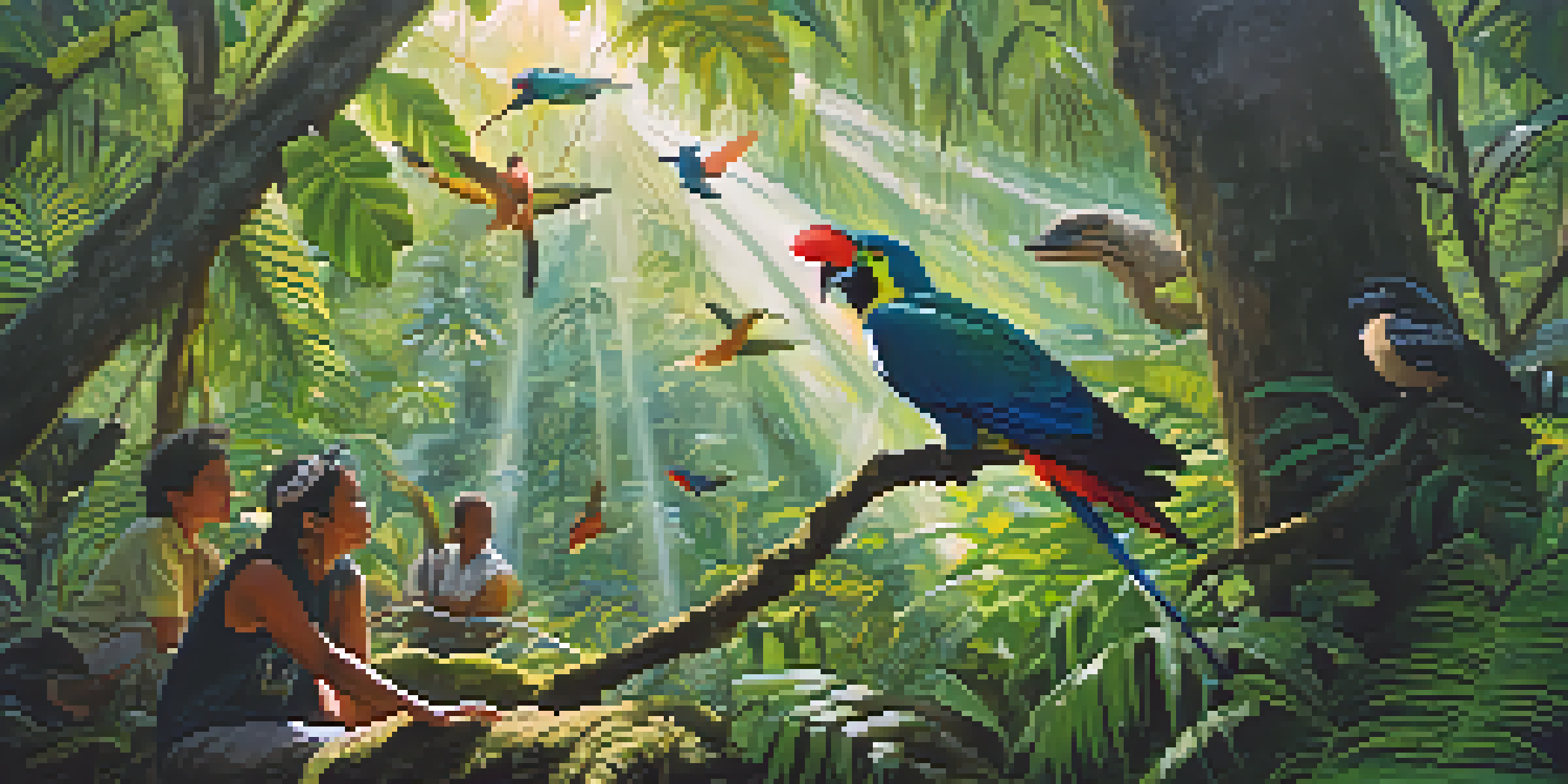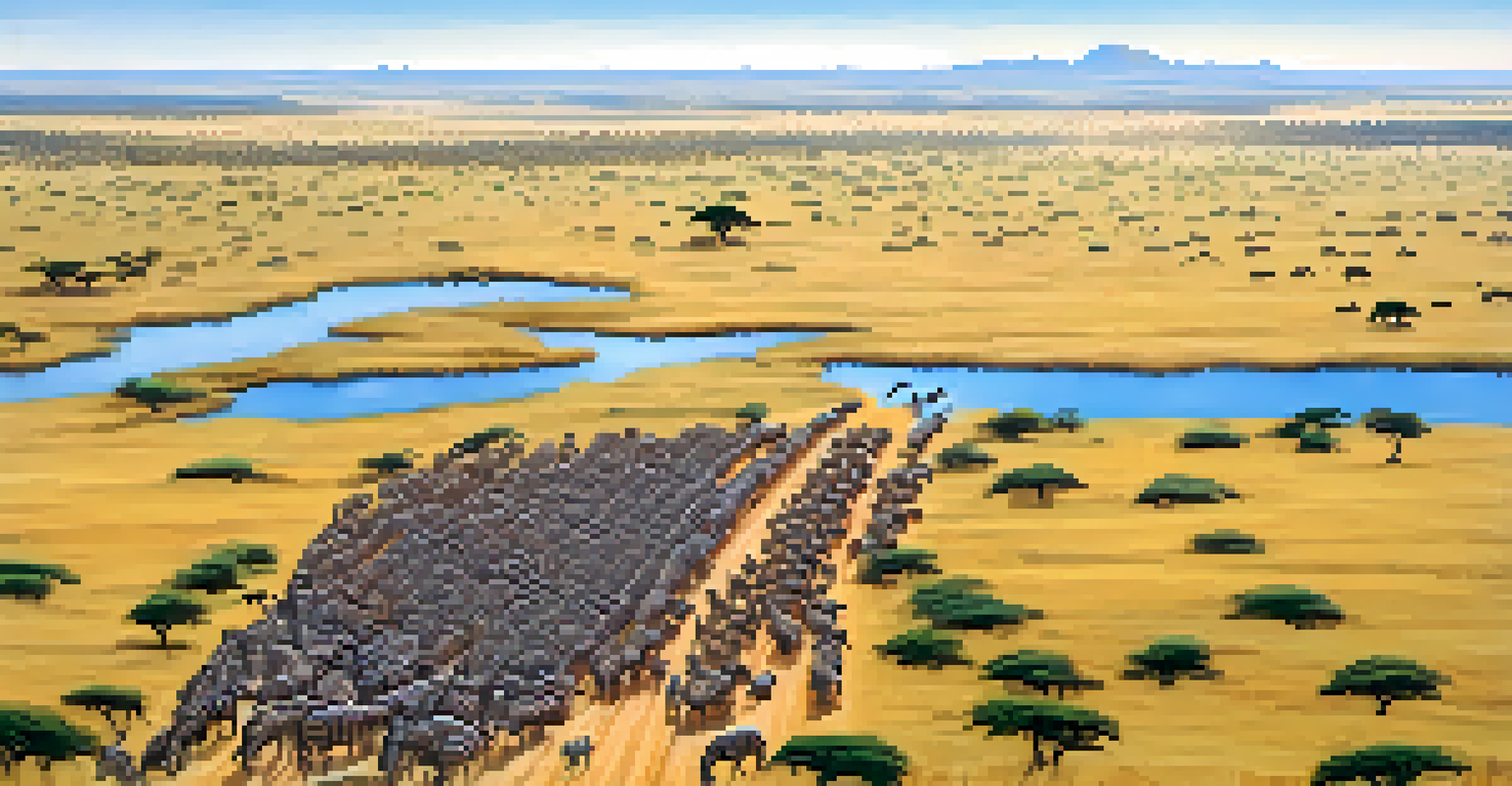Wildlife Conservation: Tourism's Role in Protecting Species

Understanding Wildlife Conservation and Its Importance
Wildlife conservation is the practice of protecting animal species and their habitats. It’s crucial not just for preserving biodiversity, but also for maintaining ecological balance. When species thrive, ecosystems flourish, benefiting us all.
In every walk with nature, one receives far more than he seeks.
Unfortunately, many species face threats from habitat destruction, poaching, and climate change. This makes conservation efforts essential for protecting not just wildlife, but the environment as a whole. By ensuring healthy populations of various species, we safeguard our planet's future.
Moreover, conservation isn't just a job for scientists and activists; it involves communities, governments, and industries. Everyone has a role to play, and that includes the tourism sector, which can be a powerful ally in these efforts.
The Intersection of Tourism and Wildlife Conservation
Tourism can significantly influence wildlife conservation by raising awareness and funds. Ecotourism, for example, encourages travelers to visit natural areas while promoting conservation efforts. This not only helps protect habitats but also educates visitors about the importance of preserving wildlife.

When tourists engage with nature, they develop a deeper appreciation for wildlife and the challenges it faces. This connection can spark a desire to support conservation initiatives, whether through donations or advocacy. The more people understand and care about wildlife, the more likely they are to protect it.
Wildlife Conservation is Essential
Protecting wildlife and their habitats is crucial for maintaining biodiversity and ecological balance.
Additionally, responsible tourism practices can create economic incentives for local communities to conserve rather than exploit their natural resources. This shift can foster sustainable livelihoods that benefit both people and the planet.
Benefits of Ecotourism for Local Communities
Ecotourism can provide substantial financial benefits to local communities, creating jobs and supporting local economies. When tourists flock to a region to experience its natural beauty, they spend money on guides, accommodations, and local crafts. This influx of cash can help communities invest in conservation efforts.
The Earth does not belong to us: we belong to the Earth.
Furthermore, when communities see the financial rewards of protecting their natural resources, they are more likely to prioritize conservation. This creates a positive feedback loop: as wildlife thrives, tourism flourishes, leading to more resources for conservation.
It's also about empowerment; local people become stewards of their environment. By participating in ecotourism, they gain a voice and a stake in the preservation of their land and wildlife, fostering a sense of pride and responsibility.
Challenges of Balancing Tourism and Conservation
While tourism can help, it also poses challenges for wildlife conservation. An influx of visitors can lead to habitat degradation, pollution, and increased human-wildlife conflict. Therefore, it’s crucial to manage tourism sustainably to mitigate these impacts.
Overcrowding in popular wildlife areas can disturb animals, interfere with their natural behaviors, and even lead to stress. Conservationists need to strike a balance between attracting visitors and preserving the delicate ecosystems that draw them in.
Ecotourism Benefits Local Communities
Ecotourism generates economic benefits for local communities, encouraging them to prioritize conservation efforts.
Implementing strict guidelines and promoting responsible tourism practices are essential. This includes limiting visitor numbers, educating tourists on minimizing their impact, and creating designated paths to protect sensitive areas.
Success Stories: Tourism-Driven Conservation
There are numerous success stories where tourism has played a pivotal role in conservation. For instance, in countries like Kenya and Costa Rica, community-based tourism initiatives have successfully protected endangered species and habitats while benefiting local populations.
In Kenya, for example, the Maasai Mara National Reserve attracts tourists eager to witness the Great Migration. The revenue generated supports anti-poaching efforts and helps maintain the park, ensuring wildlife thrives in the region.
Similarly, in Costa Rica, ecotourism has led to the preservation of vast areas of rainforest, safeguarding countless species. These examples show how, when done right, tourism can be a powerful tool for conservation.
The Role of Technology in Promoting Responsible Tourism
Technology plays a crucial role in promoting responsible tourism practices. Online platforms can educate tourists about best practices, helping them understand how to minimize their impact while enjoying nature. Apps and websites also provide valuable information about local conservation efforts.
Moreover, technology can aid in monitoring wildlife and habitats, providing real-time data to conservationists. This allows for more effective management strategies and can help identify areas in need of protection before it's too late.
Challenges of Tourism on Wildlife
While tourism can aid conservation, it also poses risks like habitat degradation and requires sustainable management.
Social media also amplifies awareness and appreciation for wildlife conservation. Travelers can share their experiences, inspiring others to visit responsibly and support conservation initiatives.
How You Can Support Wildlife Conservation Through Tourism
As a traveler, you have the power to support wildlife conservation. Choosing to participate in ecotourism and supporting businesses that prioritize sustainability can make a significant difference. Look for tours that contribute to local conservation efforts and respect wildlife habitats.
Additionally, educating yourself about the local environment and its challenges can enhance your travel experience. Engage with local guides who can share their knowledge and insights, fostering a deeper connection to the places you visit.

Finally, consider donating to organizations dedicated to wildlife conservation. Every little bit helps, and your contributions can support vital initiatives that protect endangered species and their habitats.